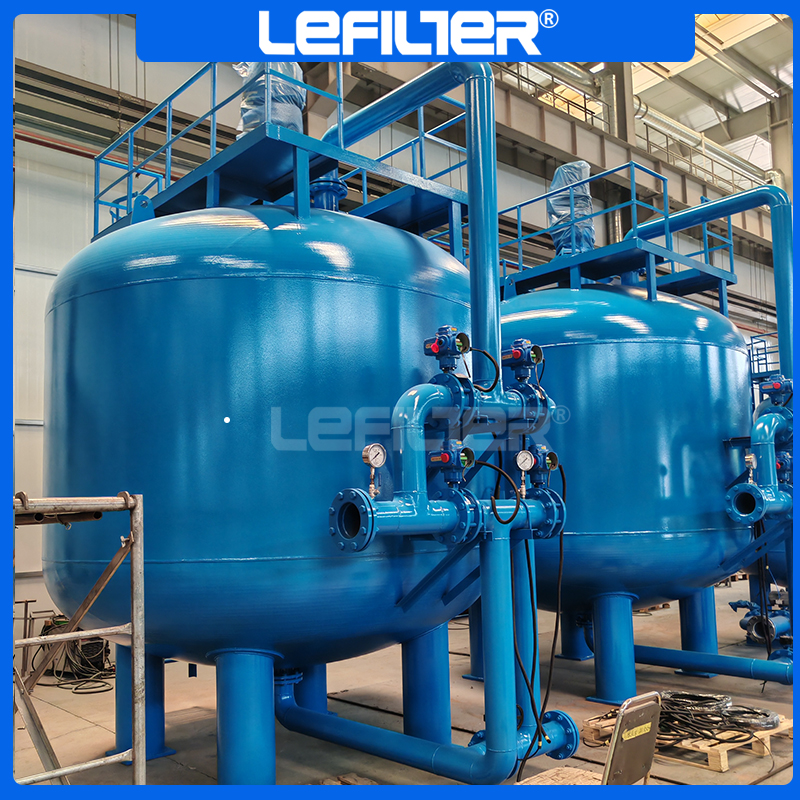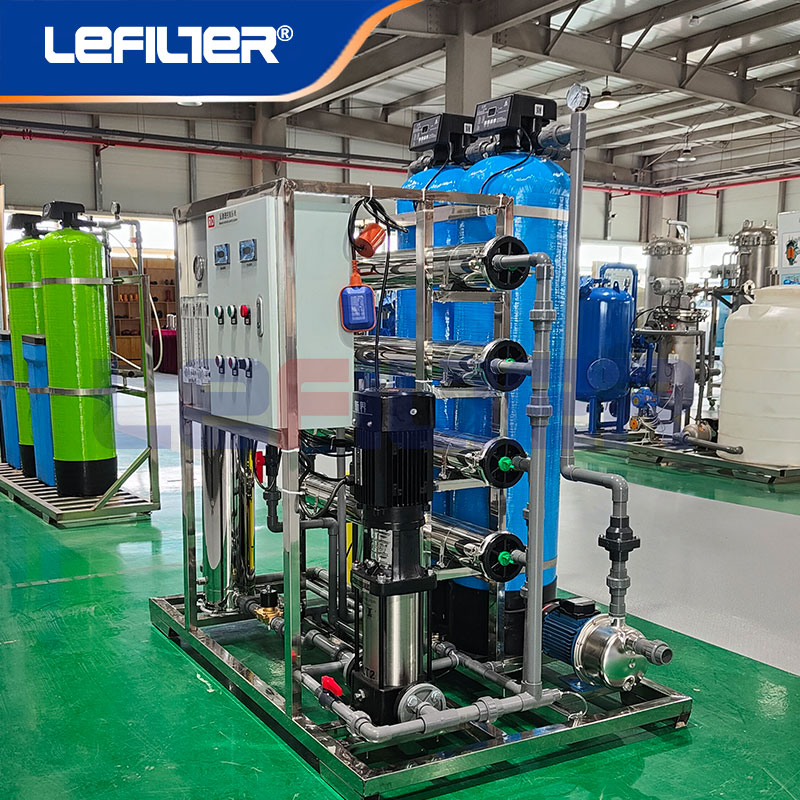Challenges in Maintaining Water Filtration Systems in Coal-Fired Power Plants
DATE:2024-12-07 Number of views: 1 Source:dongwenhui
Coal-fired power plants play a significant role in global energy generation, particularly in regions that rely on coal as a primary fuel source. However, these plants face numerous challenges when it comes to maintaining efficient water filtration systems. Coal combustion processes generate a variety of pollutants, including ash, slag, and other impurities, which can severely affect water quality and the performance of filtration systems. We explore these challenges in detail and examines how innovative filtration solutions are helping coal-fired power plants tackle these issues and improve operational efficiency.
The Role of Water in Coal-Fired Power Plants
Water is used extensively in coal-fired power plants for cooling, steam generation, and ash handling. The water is sourced from nearby rivers, lakes, or other bodies of water and goes through several stages of filtration and treatment before it can be used in the plant's operations. The cooling water, for example, absorbs heat from the steam condensers and is returned to the environment, while boiler feedwater must be free of impurities to avoid scaling, corrosion, and fouling in boilers and turbines.
However, the combustion of coal produces significant amounts of ash and slag, both of which can introduce contaminants into the water. Ash, in particular, is composed of fine particulate matter that can be difficult to filter out. Additionally, coal water treatment and handling systems are prone to clogging, scaling, and fouling, all of which present challenges for maintaining efficient operations and compliance with environmental standards.
Key Challenges in Managing Ash, Slag, and Water Impurities
1. Ash and Slag Contamination
During coal combustion, a large portion of the coal does not burn completely and is converted into solid waste in the form of ash and slag. This material can enter the water system through the process of ash handling and cleaning or from the cooling water, especially if the plant uses a wet ash removal system. Ash and slag are highly abrasive and contain fine particulates that are difficult to filter out. When suspended in water, these contaminants can clog filters, reduce the effectiveness of filtration systems, and cause mechanical damage to pumps, valves, and other equipment.
2. Scale Formation
Coal-fired plants require large amounts of water for steam generation. Over time, impurities such as calcium, magnesium, and other dissolved solids can precipitate out of the water, forming mineral scale deposits on heat exchange surfaces, pipes, and filters. Scale buildup reduces heat transfer efficiency, increases energy consumption, and can result in costly maintenance and downtime. Efficient filtration systems are necessary to remove these dissolved solids and prevent scale formation in critical components.
3. Corrosion and Fouling
Corrosion is a major issue for coal-fired power plants, particularly in the water treatment and cooling systems. The presence of acidic compounds, dissolved gases such as carbon dioxide and sulfur dioxide, and oxygen in the water accelerates corrosion of metal surfaces. Fouling, which occurs when organic materials, bacteria, or algae accumulate on surfaces, also contributes to the degradation of equipment and the efficiency of filtration systems. Both corrosion and fouling can significantly reduce the lifespan of components and lead to higher operational costs.
4. Suspended Particles and Sediments
Water used in coal-fired plants often contains suspended solids, including dirt, silt, and organic debris. These particles, if not properly filtered out, can accumulate in cooling systems, reducing the efficiency of heat exchange and water flow. Suspended solids can also cause blockages in filtration units, leading to increased maintenance and operational interruptions.
5. Environmental Compliance
Coal-fired power plants are subject to stringent environmental regulations aimed at reducing the release of pollutants into the environment. Contaminated water discharged from the plant can negatively impact local water bodies, harming aquatic ecosystems. Therefore, maintaining high water quality is essential not only for the plant's efficiency but also for meeting regulatory requirements, particularly those related to water usage and discharge.
Innovative Filtration Solutions for Coal-Fired Power Plants
Given the numerous challenges that coal-fired power plants face in managing ash, slag, and water impurities, it is essential to implement effective filtration solutions. Innovative technologies are continually being developed to address these challenges and improve the overall performance of filtration systems. Below are some of the most promising filtration solutions currently in use in coal-fired power plants.
1. Advanced Cartridge Filters
Cartridge filters are commonly used in coal-fired power plants to remove fine particulate matter from water. These filters have a high surface area, which allows them to capture a large volume of contaminants without clogging quickly. Advanced materials, such as pleated polypropylene and stainless steel, are used to increase the efficiency and lifespan of cartridge filters. By capturing ash, slag, and other suspended solids, these filters prevent clogging in cooling systems and heat exchangers.

2. Multimedia and Sand Filters
Multimedia and sand filters are effective at removing large particles, sediment, and suspended solids from water. These filters are composed of multiple layers of filter media, such as anthracite coal, sand, and gravel, which trap particles of different sizes. The use of multimedia filtration systems allows for deeper filtration and better removal of larger particles and sediments, improving the quality of water entering the cooling systems.

3. Coalescing and Oil-Removal Filters
Coal combustion can release oils and other hydrocarbons into the water, which can cause fouling and reduce the effectiveness of cooling systems. Coalescing filters are specifically designed to remove oils and emulsified particles from water. These filters cause the oil droplets to clump together and form larger droplets, which can then be separated from the water. This prevents oil from building up in the cooling system and helps to maintain the efficiency of the filtration process.

4. Reverse Osmosis (RO) Systems
Reverse osmosis is a highly effective filtration method that uses a semi-permeable membrane to remove dissolved solids, such as salts and minerals, from water. This process can be particularly useful in preventing scale formation and ensuring that water used in steam generation is free from contaminants. By producing high-quality demineralized water, reverse osmosis systems help protect boilers and turbines from damage caused by scale buildup.

5. Electrocoagulation
Electrocoagulation is an advanced water treatment technology that uses electrical currents to destabilize contaminants in water, causing them to aggregate and form larger particles. These particles can then be removed through filtration. Electrocoagulation is particularly effective at removing fine particulate matter, metals, and organic compounds, making it an ideal solution for treating water with ash, slag, and other coal combustion by-products.
6. Automated Self-Cleaning Filters
Automated self-cleaning filters are designed to remove large volumes of particulate matter with minimal human intervention. These filters use a backwashing mechanism that automatically cleans the filter media, allowing for continuous operation without the need for manual cleaning or replacement. Self-cleaning filters are particularly useful in coal-fired power plants where high concentrations of ash and slag can quickly clog conventional filtration units.

Conclusion
Maintaining water quality in coal-fired power plants is a complex and challenging task. Ash, slag, scale, and other impurities can cause significant damage to the cooling and water treatment systems, leading to increased maintenance costs and potential safety risks. However, with the implementation of innovative filtration solutions such as advanced cartridge filters, multimedia filters, reverse osmosis systems, and electrocoagulation, coal-fired power plants can effectively address these challenges. By improving water quality, these filtration technologies not only enhance the efficiency of power generation but also help power plants comply with environmental regulations and ensure long-term sustainability.
FAQ
What is the role of water in coal-fired power plants?
Water is used for cooling, steam generation, and ash handling in coal-fired power plants.What are the primary challenges in maintaining water filtration systems in coal plants?
The main challenges include ash and slag contamination, scale formation, corrosion, fouling, and the presence of suspended particles.How do ash and slag affect water filtration systems?
Ash and slag contain fine particulates that can clog filters, reducing their efficiency and causing damage to equipment.What is scale formation and why is it a problem in coal-fired power plants?
Scale formation occurs when dissolved solids precipitate out of the water, forming mineral deposits that reduce heat transfer efficiency and increase maintenance costs.What types of filters are commonly used in coal-fired power plants?
Common filters include cartridge filters, multimedia filters, coalescing filters, reverse osmosis systems, and self-cleaning filters.How does reverse osmosis help in coal plant water treatment?
Reverse osmosis removes dissolved solids and minerals from water, preventing scale formation and ensuring high-quality water for steam generation.What is electrocoagulation and how does it improve water filtration?
Electrocoagulation uses electrical currents to destabilize contaminants, causing them to form larger particles that can be removed by filtration.How do self-cleaning filters benefit coal-fired power plants?
Self-cleaning filters automatically remove particulates, reducing the need for manual cleaning and ensuring continuous operation.


